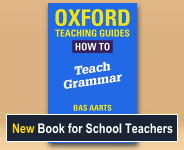Certainty and uncertainty: Activity 2
Rank the given examples in order from most certain to most uncertain, with most certain at the top and most uncertain at the bottom. Identify the words in the examples that help to convey certainty or uncertainty. Are they modal auxiliary verbs? Adverbs? Main verbs? What conclusions can you make about the way that individual word choices affect the certainty of expressions?
This may not be easy, and some examples may be debatable!
Compare your rankings with somebody else. Are there any areas of disagreement?
»
- Printer-friendly version
- Log in to view or leave comments


